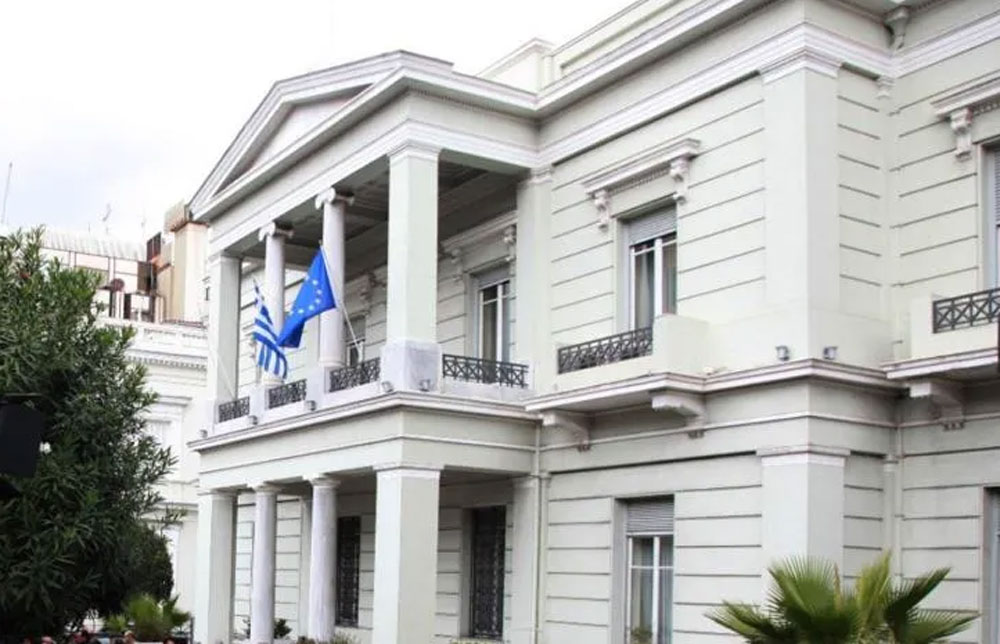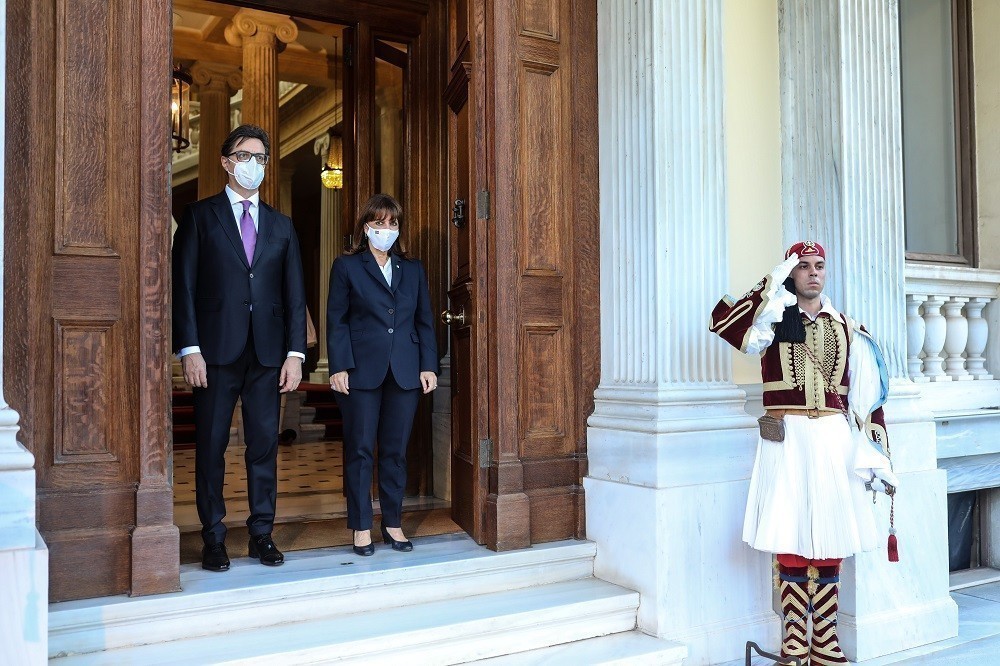
#Tags:
North MacedoniaThe Prespes Agreement opens a lot of doors of opportunities, Mancevski says
The visit of Greek Prime Minister Alexis Tsipras to North Macedonia this week with a large business delegation, is definitely going to provide with more business opportunities, more investments on both sides, to expand the business relations, open more jobs and to provide much better perspectives for the citizens, Damjan Mancevski, Minister of Information Society and Administration of North Macedonia said in an interview with the Athens-Macedonian News Agency (ANA) released on Monday.
“So, we really welcome Mr. Tsipras coming his first visit to Skopje and we are going to be more than happy and glad to welcome him,” he added.
The full interview to Dimitris Manolis follows:
Since the Prespes Agreement came into force, what steps have been taken in order to be implemented?
First of all, the necessary changes of the Constitution of North Macedonia did take place and now the implementation of the change of the Constitution name is happening throughout the entire institutions and through the system. According to the calender, also which is part of the agreement, there is a certain time that all these changes need to take place. Second of all, we have already some concrete agreements, concrete steps in order to improve the life of the citizens of both countries. Me and Mr. Pappas signed the memorandum for reducing the roaming fees for the citizens hoping to start delivering concrete results before of the beginning of this summer holidays this year and hopefully to fully annul the roaming fees by the end of 2021.
Today it was announced the visit of Greek prime minister Alexis Tsipras to North Macedonia next week with a large business delegation, which is definitely going to provide with more business opportunities, more investments on both sides, to expand the business relations, open more jobs and to provide much better perspectives for the citizens.
During the visit we also expect several bilateral agreements to be signed between line ministries on different topics and issues. So, all these things that could never happen so far and until now because we had the dispute regarding the name. We are falling behind heavily 3 decades. We also try to may be catching up what the businessemen already are doing. There are a lot of Greek investments in North Macedonia already. But now we can expand, have much more and we are going establish mutual cooperation in mainly other field and areas.
What does Tsipras’ visit in North Macedonia signal?
The visit is aimed to establish concrete results, especially in the economic fields and economic areas. There are no political disputes no more, there are no political issues to discuss, which is fortunately. Now we can focus on broader issues, in every day issues for the citizens of both countries. We are preparing to sign several concrete bilateral agreements that are going to have concrete effects from day one. These meetings should happen more frequently and more often, especially in the area of economy and different other ways in which we can cooperate. So, we really welcome Mr. Tsipras coming his first visit to Skopje and we are going to be more than happy and glad to welcome him.
What opportunities are there for Greek companies to invest in digital and information field in North Macedonia?
There are several ICT Greek companies which are all present on the market there and present for a long period of time. If you remember before the acquisition of OTE from Deutsche Telekom, OTE was one of the mobile operators in North Macedonia. The largest bank in North Macedonia is owned by NBG. There are many other examples. Veropoulos is present. Many other big Greek companies are present for more than one or two decades in the market and they have positive experience, since they are still there and they function and obviously do a good business.
This is only going to assure or motivate other Greek companies as well, that it does make sense to invest in North Macedonia in order to establish profits.
But also vice versa, why not. Especially in the area of digital economy, digital society, we can cooperate, without even physically being in one place or the other. There are joint projects that we can engage into developed technologies, fight fake news through fact checking platforms that they are going to be establish in two countries.
But also in different other areas. For instance, we were discussing with minister Pappas, even during his visit that we would like to use your experience into the establishment of this smart agricultural system that it is on the very beginning stages here as well, but we are closely watching it and we also agreed to pilot it in North Macedonia based on your experience to see if it fits our needs. These are very few examples that I am giving you that we can establish different kind of cooperation in the area of digital as well. We are at the very beginning stages, the opportunities are enormous, and there are a lot of chances ahead of us. We need to explore, we need to meet, we need to see, and there would be much more results in the future.
Does the Prespes Agreement pave the way to enhance the economic cooperation between two countries in vital areas?
Absolutely, it was the only obstacle. It opens a lot of doors of opportunities. It was a significant way on us, as a country; not only with Greece, but during these last 20 months of this government we have resolved all bilateral issues with all of our neighbors. It was not only Greece, we had problems with Bulgaria and so forth and so on. Now North Macedonia is a country in the middle of the Balkans with no bilateral issues with none of its neighbors. It’s quite rare, we have to admit it.
Also the compromise with the agreement that was being made, the way that two prime ministers resolved it, I think that really showed an example not only to the region, to the world. How historical disputes can be resolved with understanding, with dialogue, with compromise in a very short period of time. These two men did not know each other only until only a year ago. They met for the first time and they did find an understanding.
So, I think that was a historical moment not only for both countries, but for the region and also for Europe, because unfortunately lately there are not very good news coming from generally from world and European politics as well. And I hope this is going to pave the way and show the way for resolution of other conflicts as well. So, again the focus would be on the citizens and how they can cooperate better, communicate better, profit better from each other cooperation.
What is the significance and impact of the Prespes Agreement for Southeast Europe countries. Which would be the role of Greece and North Macedonia in that region?
Greece always tried to portray itself in the past as the provider of stability and balance in the region. Now it showed it can be. What is the spillover effect; North Macedonia has no bilateral issues with our neighbors, we are now landing the integration path in NATO. But now there is a big pressure on the other countries with bilateral disputes in the region, such as Serbia and Kosovo. The focus has shifted there. And the messages; if these two, Greece and North Macedonia succeeded in finding a compromise then anything is possible. It does provide this positive spillover effect not only to the region but hopefully to other bilateral problems in the world as well. It was a difficult issue to be resolved; it was open almost for three decades. We resolved and the world did not come to an end for the people in two countries. Nothing changed in the life of everyday Greek or in North Macedonia. Life continues. It only can be better.
Greece and North Macedonia we were never enemies. Besides the problem of the name issue, the two countries never became enemies to each other on multilateral level, which was good. The business relations were going, we were coming for holidays in Greece, and Greek citizens were coming to North Macedonia. But it was still burden that now it is out of the way.
What is the biggest effect? The two countries were not enemies but we did put obstacles to each other on multinational organizations. All of the sudden and overnight Greece from one of the biggest skeptics of North Macedonia’s integration into the EU and NATO, became our biggest supporter. It was a very positively strange image to see that the Greek officials in EU and NATO are the biggest supporters of our Euro-Atlantic integration. And this was visible to the citizens as well. Overnight just because of the signing of the agreement someone who was until yesterday stoping us, all of the sudden became the biggest supporter.
The two countries are not only building friendly relations, but they are becoming serious allies in multinational organizations as well.
Source: ANA-MPA

